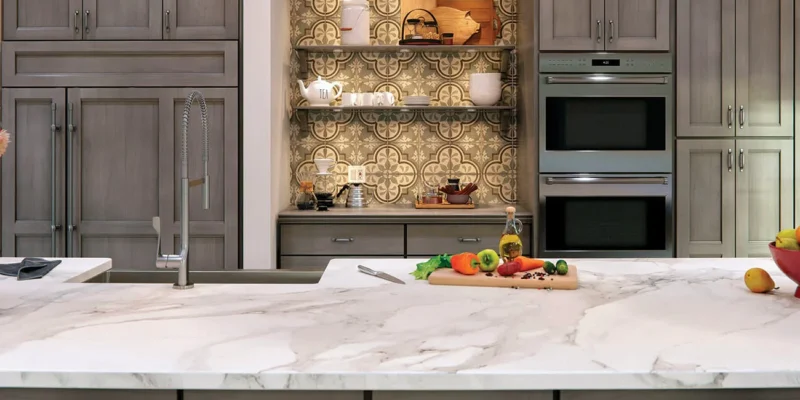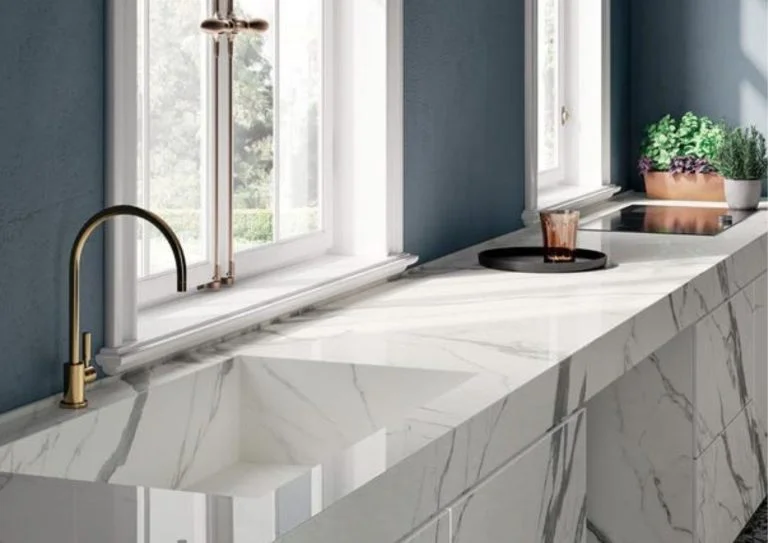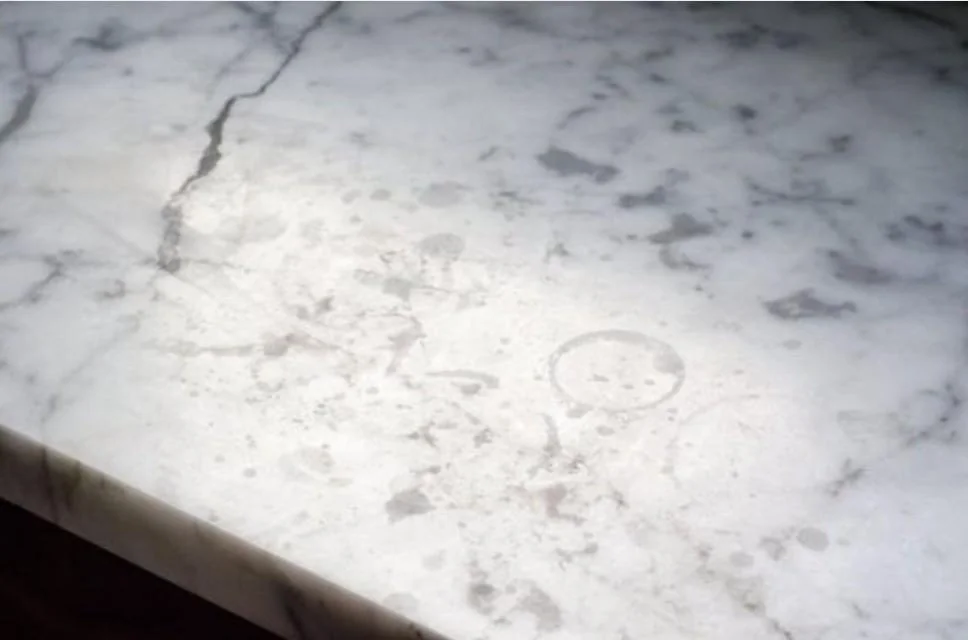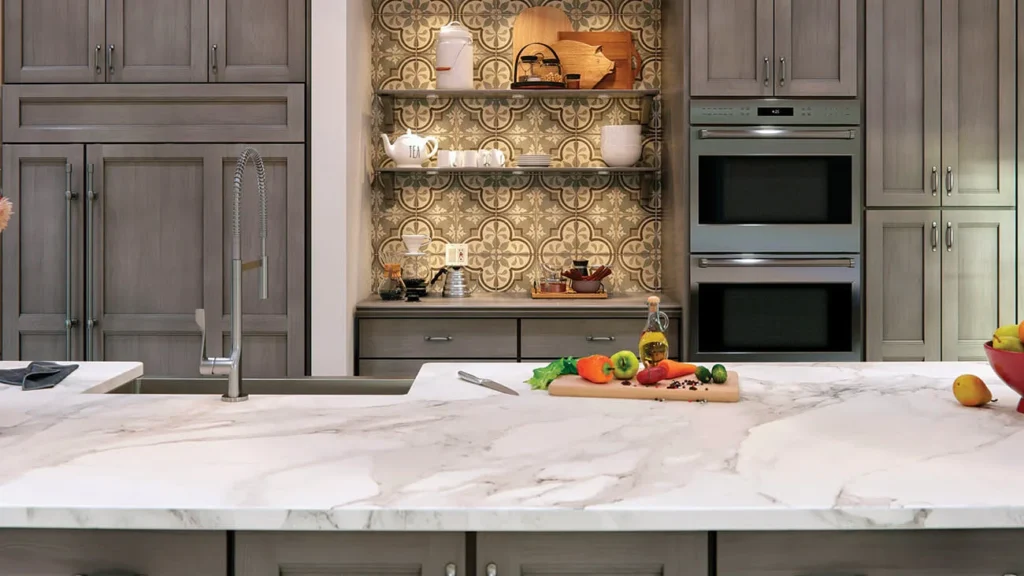


When it comes to modern kitchen design in Ontario, homeowners are constantly searching for a surface that is both stylish and practical. Porcelain countertops have gained massive popularity in recent years thanks to their sleek look, wide design options, and reputation for durability. But one of the most common questions people ask before investing in porcelain is: Does porcelain countertops stain?
This article explores the truth behind porcelain’s stain resistance, what makes it unique compared to granite or quartz, and how Ontario homeowners can keep their kitchens looking flawless.

What are porcelain countertops made of?
Porcelain is created from a blend of natural materials such as kaolinite clay, feldspar, and silica, fired at extremely high temperatures. This process results in a dense, non-porous surface that is harder and thinner than most natural stones. Unlike marble or granite, which may require sealing, porcelain is designed to resist absorption right from the start.
Why porcelain has become so popular in Ontario kitchens
Ontario homeowners often face a wide range of lifestyle needs—from busy family kitchens with kids to elegant condo spaces in Toronto. Porcelain countertops fit both worlds perfectly:
Aesthetic variety: They can mimic natural stone, wood, or even concrete finishes.
Space efficiency: Large slab sizes allow for fewer seams and a sleek, modern look.
Durability: Scratch resistance and heat tolerance make them practical for everyday cooking.
Porcelain vs. other countertop materials
Compared to granite, porcelain is lighter and doesn’t need sealing.
Compared to quartz, porcelain offers better heat resistance and is UV-resistant, making it suitable for both indoor and outdoor kitchens.
Compared to marble, it’s far less prone to etching and staining.

One of the biggest selling points of porcelain is its non-porous surface. Unlike natural stones such as granite or marble, which can absorb liquids if not sealed properly, porcelain has an incredibly low water absorption rate—less than 0.5%. This means that common household liquids like coffee, tea, wine, or tomato sauce are far less likely to penetrate the surface and cause stains.
Non-porous material: Liquids remain on the surface rather than seeping in.
High-density structure: The firing process creates a glass-like hardness that protects against absorption.
Built-in protection: Unlike granite, which requires regular sealing, porcelain comes “ready to use” with stain resistance from day one.
While porcelain countertops are highly resistant, they are not completely invincible. A few situations can cause discoloration if not handled properly:
Strong dyes or chemicals (like hair dye, food coloring, or harsh cleaning agents) left on the surface for a long period.
Surface buildup from oils, grease, or soap residue, which can make the countertop appear stained even if the material itself isn’t.
Improper cleaners: Abrasive cleaners can scratch or dull the glaze, which may make the surface more vulnerable to discoloration over time.
Imagine spilling a glass of red wine during a family dinner in your Toronto condo kitchen. On marble, this could leave an immediate stain if not cleaned up quickly.

One of the biggest advantages of porcelain countertops is that they are very low-maintenance compared to natural stone. You don’t need special sealing products or professional treatments—just a few simple habits will keep them looking as good as new.
Warm water + mild soap: For everyday messes, wipe down the surface with a damp cloth and a drop of dish soap.
Microfiber cloths: These work best since they lift dirt without scratching the glaze.
Quick spill cleanup: Always clean up coffee, wine, or food spills right away, even though porcelain is highly resistant.
Non-abrasive cleaners only: Avoid scouring pads or harsh powders that can dull the finish.
Grease and oil buildup: Use a gentle kitchen degreaser or a vinegar-water mix to cut through grease without damaging the surface.
Stubborn marks: For tougher stains (like dried tomato sauce), use a baking soda paste applied gently with a soft sponge.
Bleach or ammonia-based products: These can discolor grout lines or leave streaks.
Heavy impact: While porcelain is strong, dropping very heavy pots can cause chips or cracks.
Abrasive scrubbers: Steel wool or rough pads can scratch the glaze.
Ontario kitchens often see high usage, whether it’s cooking for family gatherings or hosting friends. A countertop that’s quick to clean and doesn’t demand sealing every few months saves time, money, and effort. Porcelain fits perfectly into the busy lifestyle of Toronto and GTA homeowners who want durability without constant maintenance.
When it comes to choosing the right countertop material for your Ontario kitchen, the decision often comes down to balancing aesthetic appeal, functionality, and long-term value. Porcelain countertops may still be considered relatively new in Canada compared to granite or quartz, but their rapid growth in popularity shows how well they meet the demands of today’s homeowners.
Stain resistance you can trust: Unlike natural stones that require sealing, porcelain’s non-porous surface is naturally resistant to coffee, wine, oil, and everyday kitchen spills. This gives peace of mind, especially for families with children or homeowners who love hosting.
Low-maintenance lifestyle: Busy homeowners in Toronto, Vaughan, Richmond Hill, or Mississauga appreciate how easy porcelain is to clean. A quick wipe is enough to keep it spotless, saving time and energy.
Durability that lasts decades: Engineered at very high temperatures, porcelain slabs are resistant to heat, scratches, and impact—making them one of the most durable countertop options available today.
Modern design flexibility: Available in a wide range of styles—from sleek solid colors to hyper-realistic marble and stone looks—porcelain allows you to achieve either a minimal, modern kitchen or a luxurious, classic aesthetic.
While granite and quartz remain strong contenders, porcelain stands out in areas like stain resistance, maintenance, and eco-friendliness. Granite, though strong, needs periodic sealing. Quartz, though non-porous, can sometimes discolor under UV light, making porcelain a better fit for bright, sunlit kitchens. For Ontario homeowners who want a surface that balances beauty, durability, and convenience, porcelain is often the smarter investment.
Porcelain countertops are competitively priced with quartz and sometimes even more affordable than high-end granite slabs. Considering that they require almost no ongoing maintenance, the long-term cost of ownership is often lower. For those renovating with resale in mind, porcelain’s rising popularity also makes it an attractive feature for potential buyers in Ontario’s competitive housing market.
So, does porcelain stain? The short answer is no—at least not under normal household use. Its superior resistance to spills, ease of cleaning, and modern appearance make it one of the best countertop choices for Ontario kitchens. Whether you’re updating a condo in downtown Toronto, designing a family kitchen in Richmond Hill, or renovating a luxury home in Oakville, porcelain countertops offer the perfect balance of practicality and style.
If you’re looking for a countertop that won’t stain, won’t demand constant maintenance, and will elevate the look of your kitchen, porcelain deserves to be at the top of your list.